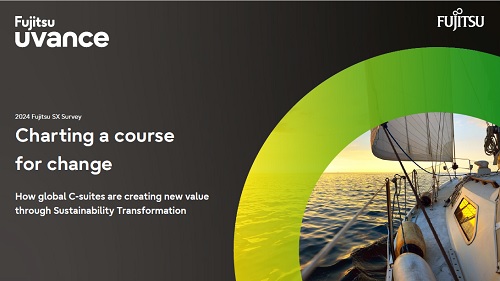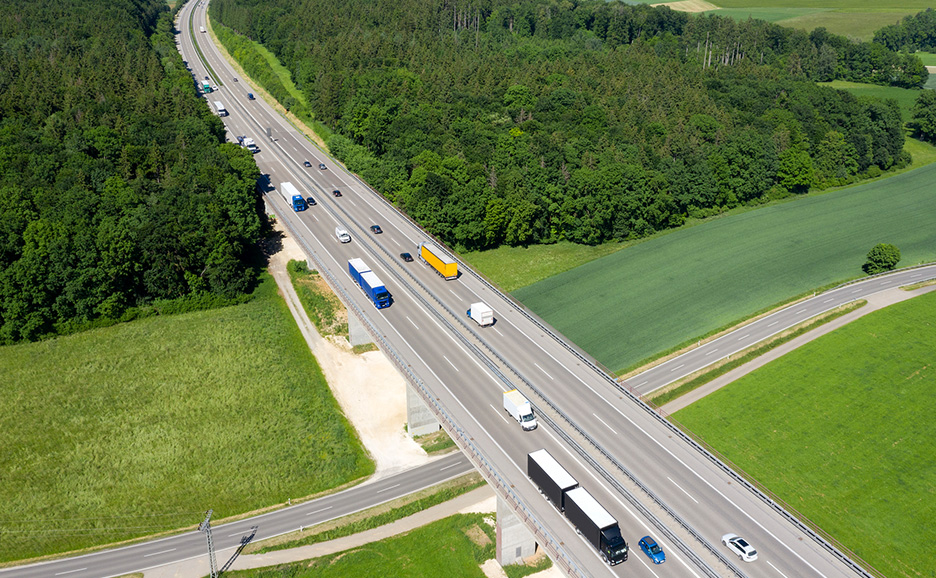Reflections from Sustainability Week: Countdown to COP29 in Amsterdam Becoming Positive about Net Positive

Report|2024-10-30
5 minute read
Sustainability Week, organized by Economist Impact, was held in Amsterdam, Netherlands, on October 7-8, 2024.
Fujitsu's Corporate Vice President Onishi and Executive Officer Yamanishi (CSSO) participated in the event, discussing practical strategies for a sustainable future with leaders and experts in sustainability from around the world. Fujitsu is committed not only to providing innovative technologies to achieve a sustainable future, but also to engage in dialogue and collaborate with society as a whole.
Becoming Positive about Net Positive
Reflections from Sustainability Week: Countdown to COP29 in Amsterdam
‘It’s an exponential problem, and we’re moving at linear speed’. Paul Polman, former CEO of Unilever, and author of the book ‘Net Positive’ left the audience in no doubt as to the challenge we face when it comes to sustainability.
Sustainability Week: Countdown to COP29 brought together business leaders and sustainability professionals to drive actions for the most pressing problems we face. Convened by the Economist, Paul Polman’s keynote was the first highlight of a packed agenda, featuring panel sessions, fireside chats, round table discussions and networking. The objective to focus minds on the lead up to COP29, the annual global environmental conference.
Paul Polman kicked off the event, in conversation with Phillip Cornell of the Economist Impact, by framing the problem. Speaking to a packed room, he noted that we are using resources beyond the sustainable bounds of our planet. This year, by the 1st August the world had used up a year’s worth of resources, a moment described as ‘Earth Overshoot Day’. Resource use beyond this date is borrowing from future generations.
But his overall message was positive. He emphasised the need for leadership, and particularly for CEOs to take collaborative action. Net positive is an opportunity to realise value as well as to avoid bigger costs down the line. The cost of innovation is less than the cost of inaction, and if businesses shift from a competitive to cooperative mindset, existing technologies could provide practical answers to 80% of the problems . He also warned against the tendency for many organisations to have their sustainability departments acting as the compliance department. Instead of aiming for perfection from the beginning, he believes that simply putting forward the best effort is more important.

Fujitsu Uvance sponsored the event, and Fujitsu’s COO and CRO, Shunsuke Onishi, was on hand to speak with Jonathan Birdwell from the Economist Impact about some of the ways that technology can offer solutions, as well as announcing a major partnership with The Economist Impact.
During the conversation, Jonathan asked him to characterise what sustainability means to Japanese companies. Onishi emphasised resilience as a key priority. Japan has an aging population and therefore a shrinking working population. Furthermore, the country is resource-poor and used to suffering frequent earthquakes and extreme weather. On this latter point, Onishi observed that Europe is also starting to experience with heatwaves and floods and can maybe learn from Japan, noting that Fujitsu’s innovative technologies are supporting organisations from diverse fields in building more resilient supply chains.
As an example, Onishi referenced Fujitsu’s collaboration with a Property and Casualty Insurance company using AI and blockchain technology to visualize risks in the supply chain. He described how Fujitsu has integrated inventory data for another customer, a major manufacturer and optimised using AI. After the destructive New Years Day earthquake centred on Japan’s Noto Peninsula, Fujitsu provided real-time impact assessment for this customer, profit and loss impacts were evaluated in just two days.
Challenged by Jonathan Birdwell on the negative impacts of technology, Onishi cited Fujitsu’s use of AI to deliver more energy efficient GPUs to reduce the amount of electricity consumed by AI. He acknowledged that technology is an important piece of the sustainability puzzle, but that technology itself must also be sustainable. He went on to explain that driving sustainability is at the core of Fujitsu’s Purpose and that Fujitsu Uvance is the business model the company has built to promote sustainability across society.
This dedication to sustainability is taking shape through Fujitsu Uvance, a business model designed to spur business growth while also addressing societal challenges. One solution that typifies this model is Unified Logistics, which improves industry-wide efficiency by connecting a wide array of logistics data to optimize transportation routes and reduce GHG emissions. Connecting data is at the heart of optimising operational planning and process efficiency, while also supporting real-time field response to disasters, conflicts and inevitable changes to operating conditions from day to day. These connections can also help alleviate pressing issues such as labour shortages.


Like Paul Polman, Onishi emphasised that it is difficult to achieve results working alone. Data is a key element, and Fujitsu Uvance helps connect processes and data fragmented across industries to achieve more sustainable business practices.
When asked by Jonathan about where businesses should concentrate their strategic priorities in this era of uncertainty and growing demand for sustainability, Onishi offered three suggestions: Taking a long-term approach, setting materiality targets, and ensuring approaches are economically viable.
Over lunch, The Economist Impact convened a round table discussion attended by a dozen sustainability leaders from across industries, along with Fujitsu’s CSSO (Chief Sustainability and Supply Chain Officer), Takashi Yamanishi. The wide-ranging conversation covered a lot of ground, but key themes emerged around the importance of communication, how to deliver circularity from R&D through to legacy, and the role of people and skills.
Throughout the day, leaders from across industries provided insights and experiences. Nicoletta De Silva of Reckitt described how storytelling is key. ‘Empathy triggers action’ she said. Brands are open to new experiences and purpose causes consumers to shift categories.
Stuart Jefford of The Lego Group in an inspirational session spoke about how driving innovation to solve difficult problems is the business we are all in. If the challenges weren’t difficult, they would have been solved by now.

But returning to the beginning of the day, Paul Polman concluded with three priorities for organisations to achieve more sustainable business results.
(1) See sustainability as an opportunity not as a cost
(2) Have visibility of your impact on the world
(3) Set long term targets, in line with science not the period of CEO tenure.
This aligned perfectly with what was coming from Shunsuke Onishi. He took the opportunity to announce that Fujitsu, in collaboration with the Economist Impact, will be launching a Net Positive Index in January 2025 at the World Economic Forum. This initiative aims to support business leaders in measuring and targeting net positive impact on both the environment and society. Stay tuned for more news on this.
The Net Positive Index will be a valuable to tool for organisations to take proactive action and get ahead on the journey to Net Positive. As Paul Polman put it, ‘Either you’re making dust … or eating dust’.
Shunsuke Onishi
Corporate Executive Officer
Corporate Vice President, COO (in charge of Regions), CRO, Fujitsu Limited
Shunsuke Onishi is focused on driving growth across businesses and the globe by relying on a strong value-driven customer approach. Before Onishi has held multiple C-level positions at Fujitsu in customer excellence mainly targeting the Manufacturing sector. He has led the launch of Sustainable Manufacturing in Fujitsu Uvance - the new global business brand of Fujitsu.

Takashi Yamanishi
EVP CSSO (Chief Sustainability & Supply Chain Officer), Fujitsu Limited
Takashi Yamanishi joined Fujitsu in 1989, with his primary focus being procurement from global vendors in areas such as software and semiconductors. He oversaw the global integration of procurement and supply chain management organizations as General Manager of the Global Supply Chain Division in 2018. Afterwards, in parallel with the shift to services within the business portfolio, he helped strengthen alliances with key partners while reforming procurement and supply chains. He assumed his current position in 2024.


Related Information

